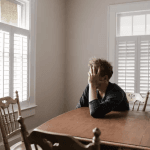Anxiety
Anxiety is an unpleasant and painful emotional state, with a feeling of uneasiness and threat to one’s physical or moral integrity. It is presented together with insecurity, perplexity, fear before a real or imaginary danger.
It is often accompanied by physiological changes similar to those caused by fear: sweating, tachycardia, difficulty breathing. It can occur unexpectedly, as in a specific disease called panic attacks, or gradually.
It is important to differentiate a normal anxiety experience, from what may be a problem that is affecting the health or is already a disease.
There is therefore a normal anxiety and a pathological one. The causes are related to organic, psychic and spiritual factors.
Causes of anxiety
There are many organic diseases that produce anxiety, for example:
- Thyroid gland problems
- Hypoglycemia
- Heart failure
- Some arrhythmias
- Pulmonary diseases
- Intoxications
Anxiety also accompanies the use or dependence on alcohol and other drugs, and may be the unwanted side effect of some medications.
The intensity and proportionality with the danger that triggers the anxiety reaction indicates whether we are dealing with normal or sick emotionality. Anxiety affects the psychic functioning, in what is felt; and physical, with its somatic changes.
The main chemical substance that is released by the stimulation of the hypothalamus-pituitary-adrenal axis is cortisol. Its sustained increase can lead to decreased immunity, the onset of various diseases and sleep problems.
Anxiety is also a symptom of many mental illnesses and of a specific group called anxiety disorders. Among these we find phobias.
There are also people in whom anxiety is a dominant personality trait, partly due to inherited temperament. If this characteristic is very intense, a diagnosis of anxious personality disorder is usually made, in which the fear of failure and rejection predominates, with an important need for esteem and affection.
How to deal with anxiety
The first thing is to try to discover the cause, because it can be something physiological or due to an organic disease.
A less obvious trigger of anxiety are automatic thoughts. It is convenient to break vicious circles of the style: fear at the sight of a person in authority → feeling uncomfortable → trembling and palpitations → more fear → more feeling of discomfort and trembling → paralysis, crying, flight, mutism.
Behind this wave of feelings may be a possible automatic thought or distorted belief: I am useless, no one considers me. Discovering this type of reasoning or missing links is important.
Some anxiety or tension is normal and healthy in the life of any person who cares about those around them, who has a project to accomplish, who loves.
When the phenomenon is experienced in an exaggerated way – perhaps also because of the characteristics of one’s own temperament – it is useful to distance oneself from the symptom, to consider anxiety as something different from oneself. Then one should try to identify the reason and try to solve it.
If the anxiety remains, even if the cause is clear but it is not possible to remove it (an exam, an uncertainty, a change of environmental circumstances…) these suggestions may be useful:
- Seek help: talk about the reasons, verbalize the cause of the fear.
- Physiological support measures: take care of sleep, do sports regularly and calmly, preferably with others; walk every day thirty or forty minutes; do relaxation exercises such as diaphragmatic breathing or progressive deep muscle relaxation.
- Decrease the use of alcohol, caffeine and stimulants (tobacco is often used by anxious people, but has many harmful effects and can also disturb sleep and promote anxiety; marijuana is often used to reduce anxiety, but brings more serious problems).
- If the anxiety is not reduced or disturbs the normal life it will be opportune to look for medical advice and support: the use of an anxiolytic medicine, indicated by a professional, during few days or some week can also be useful.
Recommended reading: Wenceslao Vial, Madurez psicológica y espiritual, Palabra, 2019 (4ª)
Learn more about anxiety






